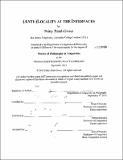(Anti-)locality at the interfaces
Author(s)
Patel-Grosz, Pritty
DownloadFull printable version (10.00Mb)
Other Contributors
Massachusetts Institute of Technology. Dept. of Linguistics and Philosophy.
Advisor
Noam Chomsky and Sabine Iatridou.
Terms of use
Metadata
Show full item recordAbstract
This dissertation investigates the constraints on referential dependency relations that can hold between epithets and their antecedents under c-command. The initial observation, presented here in (1), is that epithets can be c-commanded by an antecedent, as long as it is not the closest c-commanding element. (1) a. * Nero, thinks that [the damn traitor] will be invited to the reception. b. OK Nero, thinks that they2 will invite [the damn traitor] to the reception. C.?OK John convinced the panel2 that [the idiot], is smart. Upon closer inspection, the difference between (la) and (lb) seems to involve a subject-object asymmetry in the complement clause of think. Similarly, the contrast between (la) and (lc) suggests that the matrix predicate plays a part in the reduced acceptability of (la). The first part of this dissertation (chapter 2) concerns the syntax of epithets. I argue that epithets are null pronouns modified by a nominal appositive. This argument is based two core pieces of evidence: (i) I will present cross-linguistic evidence illustrating that epithets can be syntactically bound by a quantifier (ii) a series of diagnostics from Den Dikken (2001) and Kayne (2005). Chapter 3 and 4 of this thesis address the semantics of epithets. Following Potts (2005), I argue that epithets must be evaluated from the perspective of a given individual, the evaluator. In chapter 3, I argue that the difference between thinks and convince (cf. Stephenson (2007)) reflects constraints on the judge parameter in an embedded clause that contains an epithet. In chapter 4, I refine my proposal in the spirit of Percus and Sauerland (2003a), (2003b), and argue that cases in which the judge parameter is shifted to the matrix subject have the property of selecting a de se LF. I argue that epithets that adjoin inside such a de se LF cannot refer to the attitude holder, as the nominal appositive would have to adjoin to an uninterpreted anchor. I derive the (la)-(lb) difference by arguing that epithets can undergo LF movement from a position within the embedded object to the antecedent in the matrix clause, but not from a position in the embedded subject. Chapter 5 concludes with a discussion of the role of epithets for general theories of locality.
Description
Thesis (Ph. D.)--Massachusetts Institute of Technology, Dept. of Linguistics and Philosophy, 2012. Cataloged from PDF version of thesis. Includes bibliographical references (p. 173-179).
Date issued
2012Department
Massachusetts Institute of Technology. Department of Linguistics and PhilosophyPublisher
Massachusetts Institute of Technology
Keywords
Linguistics and Philosophy.